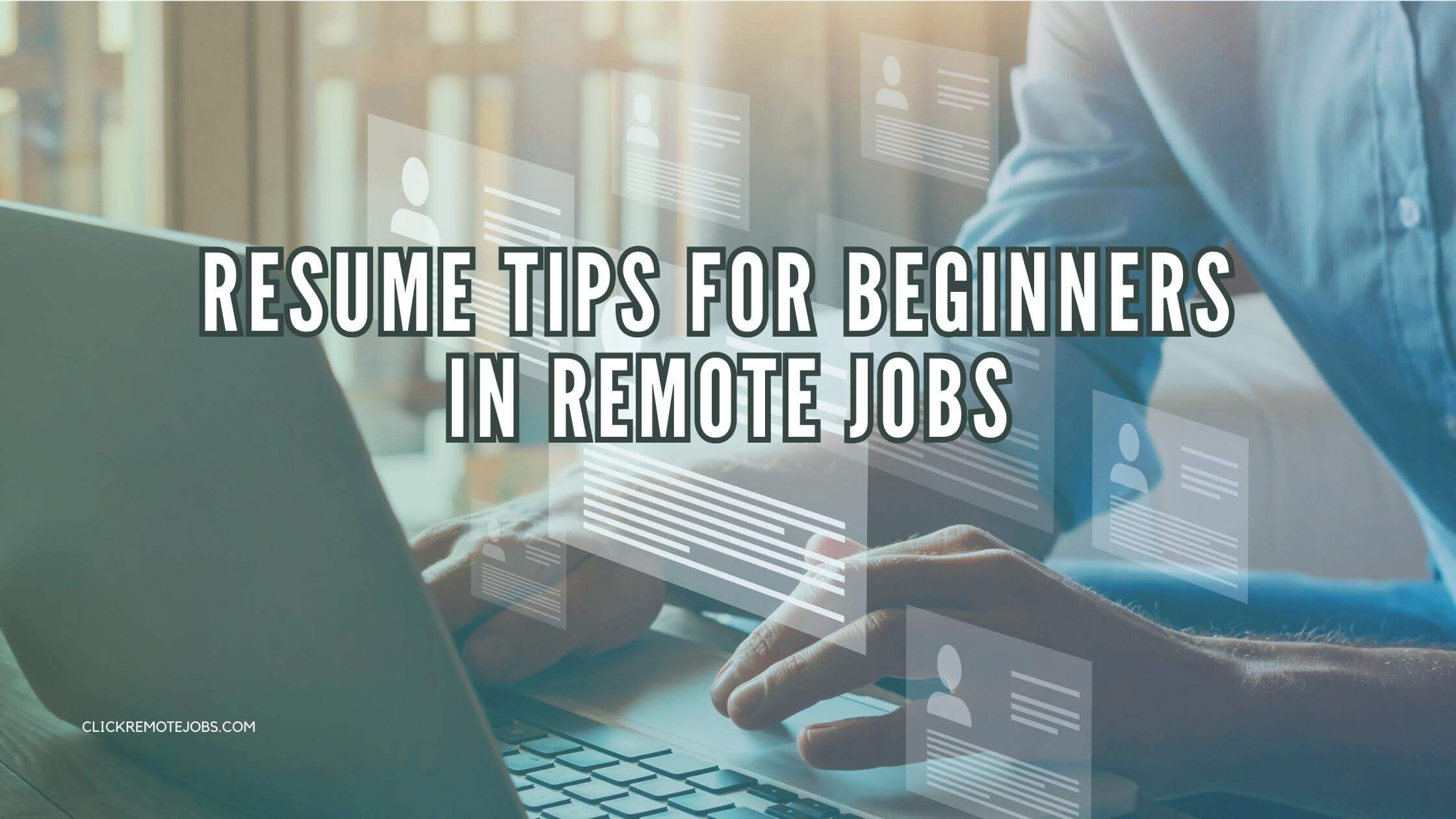In this blog, we’ll learn some resume tips for beginners in remote jobs. A resume that appeals to both ATS and human hiring managers. We will craft your own advertisement as the content of your resume advertises your uniqueness.
A well-tailored resume is your key to success, whether you’re applying for an in-office position or pursuing remote work. Your resume serves as a snapshot of your value. For instance, any beginner’s resume highlights your qualifications, work experience, skills, and professional achievements. Essentially, it’s your advertisement to potential employers.
In other words, your resume accentuates the benefits you have to offer the company. Your resume should also tailored to adapt to the demands of Applicant Tracking Systems (ATS).
Remote job resume writing tips for beginners
What your resume should have:
1. Your contact information
Include your full name, contact number, professional email address, your city or country, and a link to your LinkedIn profile.
Not necessary to include:
- Your full or exact residential address.
- Your personal information, such as your sex or marital status.
2. Your job bio or profile
Opt for a concise summary of your skills and accomplishments. And not plainly an objective.
Not necessary to include:
- Your salary requirements.
- Your benefits conditions.
3. Competences
Highlight your job-related skills (soft skills and hard skills) that proposes significant value to your prospective company.
Not necessary to include:
- Irrelevant skills that do not elucidate the job essentials.
- Skills that you are not certain are propitious to the job.
- Skills you’re not confident and irrelevant to the job.
4. Your work experience
A list of your relevant jobs in reverse-chronological order, starting with your current position. This is the section where you tell your career history.
Not necessary to include:
- Intern jobs, unless you are a fresh graduate with no work experience.
- Tired verb words or buzzwords such as “excellent,” “result-oriented,” or “focused.”
5. Education
List your education in reverse-chronological order, with your most recent achievement like a master’s degree, licenses, certificates, or education degree (mention the name of your university and taken degree course).
Not necessary to include:
- Your GPA (Grade Point Average).
- Other records unrelated to the job offer.
6. Additional Details
Add relevant coursework, volunteer engagements, received awards, or hobbies.
Not necessary to include:
- Any odd or weird hobbies like handcuff-collecting or stalking celebrities.
- An inappropriate award like “Best in Anime Customs.”

A Resume That is Applicant Tracking Systems Friendly
In today’s recruitment process, companies have taken the pleasure of integrating technology into hiring online.
In an analysis conducted by Jobscan Blog, 98% of Fortune 500 companies rely on Applicant Tracking Systems (ATS).
With that in mind, employers are actually utilizing the advantage of ATS. The ATS process is highly automated. This system has improved the recruiting process in so many ways. Aside from ATS scanning resumes way faster than humans, it also helps companies to save recruitment process time.
In addition, ATS scores applicants’ resumes according to determined preset standards as per the job requirements. As a result, international companies (even startup businesses) are hiring remote workers using ATS. Should your resume fail to meet the ATS requirement, you will never get through the next step consequently.
So what makes a resume compliant with ATS? Here are Essential resume tips for beginners:
- Apply standard section headers in your resume.
- Label your resume section headers like “Resume Summary,” “Experience,” “Competencies,” “Skills,” and “Education.”
- Relevant keywords are a must-have in your resume.
- Keyword optimization is the most important element when writing a resume for a remote job. Most ATS software solutions are operating keyword scoring. What you need to do is, firstly, find the keywords from the job post. Secondly, understand the pattern placed out in the job description. And lastly, try to visit the company website to determine if more detailed job information is available. Look for role-specific terms and skills that the job description reuses multiple times.
- A footer or header is not required.
- Anything written in these sections is invisible to the ATS. Therefore avoid placing your name or contact information in the footer or header section.
- It is best to spell out a term instead of an abbreviation.
- ATS may disregard important information from your resume. For instance, while you are submitting your resume for online jobs, you say “SEO” is one of your core competencies, spell it out as “Search Engine Optimization.”
- Format your work experience dates correctly.
- Use month and year to allow ATS to read and calculate your work tenure.
- A resume design needs to be clean.
- Customized designs such as charts may amaze a human hiring manager, however, ATS won’t acknowledge the extra
- Consider these:
- Font style: Times New Roman, Arial, Calibri
- Font size: 11-12
- Margin: one inch on each side
- Spacing: single or 1.15 line
- Submit your resume in Word document format.
- A .doc file is safe and ideal. There is some ATS software unable to read or scan the information in a PDF format.
Effective resume strategies for newcomers to remote work
What hiring managers prefer to see and value in your resume for remote jobs?
Consider these:
Relevance
Hiring managers want to see if your resume includes keywords that match the job description. This is important even for human eyes, as it helps them quickly identify if you are a good fit for the role.
Tip for you: Identify appropriate keywords. Build a list of skills, knowledge, competencies, and experience asked for the position. Next is to check your resume. Tailor your resume by including these keywords.
Career progression
Hiring managers also prefer to read resumes that tell a story about your career. This shows that you are interested in the role and that you have the skills and experience to be successful.
Tip for you: Outline the role and the key responsibilities you have held in each position. Describe how these roles contributed to your overall career success.
Experience and Skills
When applying for remote jobs, hiring managers are looking for experience and skills that are relevant to working remotely. This could include experience with project management tools, video conferencing, or other remote collaboration tools.
Tip for you: Showcase the experience and skills needed to work remotely when writing a resume. Even if you have zero experience handling a remote job position, you might have experience collaborating with co-workers or clients remotely.
Include in your resume the programs you have experience using. Such as;
- Remote collaboration tools: Dropbox, SharePoint, Zoom, Slack
- Document software: Microsoft Office (Word, Excel, PowerPoint, Outlook), Google Suite (Docs, Sheets, Slides, etc.)
- Project management tools: Asana, Trello, Wrike
Online Presence
Hiring managers may also check your online presence to get to know you better as a candidate. This includes your LinkedIn profile, personal website, and social media accounts. Your online presence gives them the opportunity to know you more as a candidate. Moreover, your content reflects your voice as well. Similarly, your professional voice online sells how you may add value to their company.
Tip for you: For that reason, make sure to include in your resume links to your LinkedIn profile, personal domain, or social media accounts. If you have not done this yet, create your own online portfolio from any free website like WordPress.
However, I highly recommend that you start building your own website. With your own platform, you can share your expertise and showcase your skills. It will serve as your base, and in a way, your online resume.
Conclusion
By following these tips, you can write a resume that will help you stand out from the competition and land the remote job you want.
Are you ready to start applying for remote jobs? Here are some tips to help you get started:
- Research companies: Before you start applying for jobs, take some time to research companies that are hiring remote workers. This will help you find companies that are a good fit for your skills and interests.
- Network: Attend industry events, connect with people on LinkedIn, and reach out to people you know who work remotely. This is a great way to learn about remote job opportunities and get your foot in the door.
- Be persistent: Don’t give up if you don’t get the first few jobs you apply for. Keep applying and networking, and eventually, you will find the right remote job for you.
I hope these tips help you in your job search. Good luck!
Here is the list of legit international companies that are offering full-time remote jobs.
